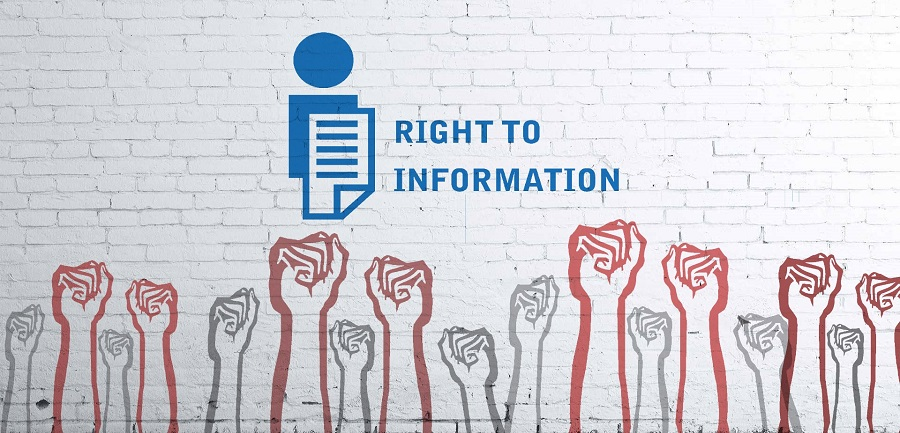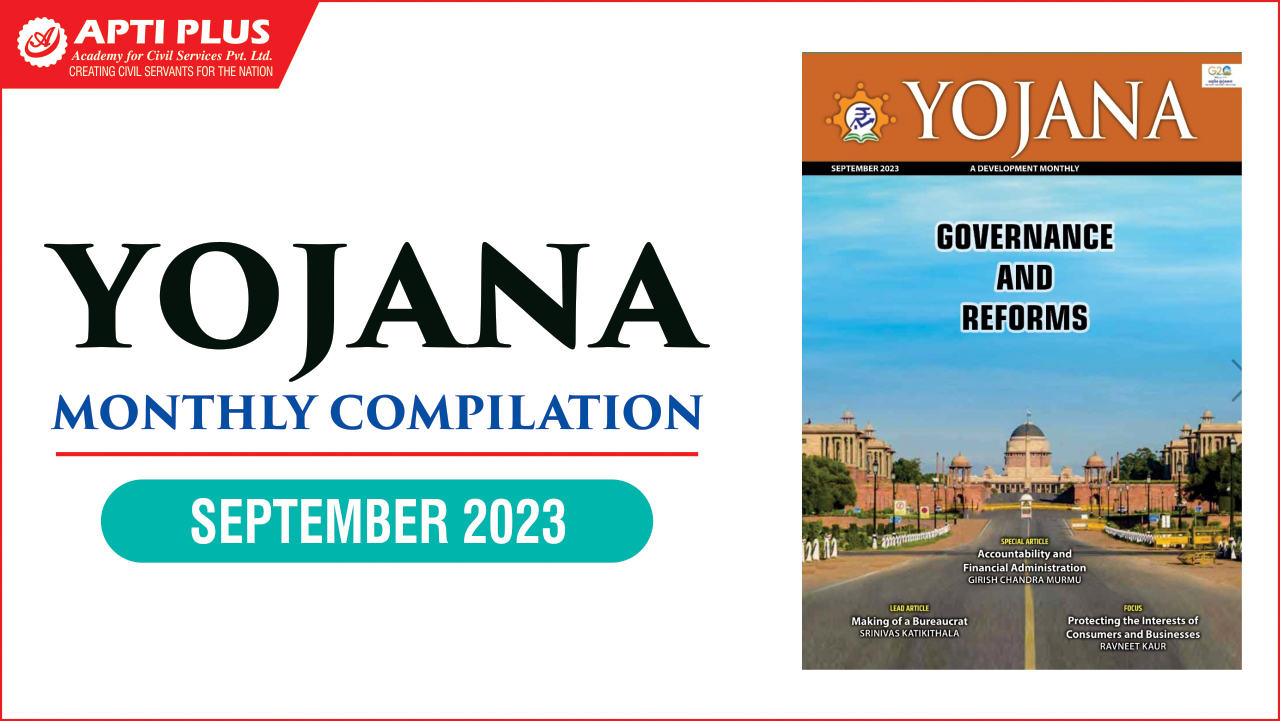
Copyright infringement not intended
Picture Courtesy: theleaflet.in
Context: The report titled "Report Card on the Performance of Information Commissions in India, 2022-23" highlights the concerning backlog of appeals and complaints in 27 State Information Commissions across India.
Key Findings of the report
- According to the report, as of June 30, 2022, a total of 3,21,537 appeals and complaints were pending, indicating a steady increase from 2,18,347 in March 2019 and 2,86,325 in June 2021.
- Maharashtra had the highest number of pending appeals and complaints (1,15,524), followed by Karnataka (41,047). Tamil Nadu did not provide the information on pending cases. The backlog has been steadily increasing, reflecting a concerning trend in the functioning of the Information Commissions.
- Four Information Commissions (Jharkhand, Telangana, Mizoram, and Tripura) are defunct as no new Information Commissioners were appointed after the incumbents left office.
- Six Information Commissions, including the Central Information Commission and those of Manipur, Chhattisgarh, Maharashtra, Bihar, and Punjab, are currently without heads.
- The report analyzed the performance of Information Commissions based on data obtained under the Right to Information (RTI) Act. It revealed that between July 1, 2022, and June 30, 2023, 2,20,382 appeals and complaints were registered. During the same period, 2,14,698 cases were disposed of by 29 Information Commissions.
- The report calculated the estimated time it would take for an appeal or complaint to be disposed of based on the average monthly disposal rate and the existing backlog. For instance, the West Bengal State Information Commission would take an estimated 24 years and one month to dispose of a matter, indicating a serious delay in the resolution process.
- The report also analyzed the imposition of penalties by Information Commissions. It found that in 91% of cases where penalties could have been imposed, they were not. This indicates a lack of enforcement and accountability measures.
- The report underscores the challenges faced by the Information Commissions in India, including backlog, vacancies, and delays in the disposal of cases. These challenges hinder the effective implementation of the RTI Act, affecting citizens' right to information and transparency in governance.

Information Commissions
About
- Information commissions are statutory bodies established under the Right to Information Act 2005. They are responsible for hearing appeals and complaints from citizens who are denied access to information by public authorities. They also monitor the implementation of the RTI Act and promote transparency and accountability in governance.
Role and Significance
|
Ensuring Citizen Empowerment
|
●Information Commissions empower citizens by granting them the legal right to access information. This empowerment is fundamental in a democratic society, where an informed citizenry is essential for active and meaningful participation in the democratic process.
|
|
Watchdogs of Democracy
|
●Information Commissions serve as watchdogs of democracy. By ensuring transparency within government bodies, they safeguard the democratic values of openness, accountability, and public participation. This oversight function is essential for the functioning of a vibrant democracy.
|
|
Guardians of Public Interest
|
●These commissions act as guardians of public interest. They protect the interests of ordinary citizens by ensuring that government actions and decisions are transparent and can be held accountable. This protection is vital in preventing misuse of power and resources.
|
|
Exposing Corruption and Maladministration
|
●One of the primary roles of Information Commissions is to expose corruption and maladministration within public authorities. By providing citizens access to information, these commissions enable the exposure of wrongdoings, leading to increased accountability and a deterrent effect on corrupt practices.
|
|
Addressing Human Rights Violations
|
●Information Commissions play a pivotal role in addressing human rights violations. When citizens have access to information, instances of human rights abuses can be brought to light, leading to corrective actions, justice, and prevention of future violations.
|
|
Addressing Public Concerns
|
●Information Commissions help in addressing various public concerns. Citizens can use the information obtained to raise awareness about issues such as environmental concerns, public health, and social welfare, leading to informed public debates and policy discussions.
|
|
Improving Public Services
|
●By facilitating access to information about government programs and services, these commissions contribute to improving the quality and efficiency of public services. Citizens can provide feedback and demand accountability, leading to continuous improvements in service delivery.
|
|
Enhancing Public Participation
|
●Access to information enhances public participation in decision-making processes. Informed citizens can actively engage in discussions about policies and programs, ensuring that decisions are well-informed, inclusive, and reflective of the needs and aspirations of the people.
|
|
Strengthening Accountability and Responsiveness
|
●Information Commissions strengthen the accountability and responsiveness of public authorities. The fear of public scrutiny encourages officials to act responsibly, adhere to the law, and be accountable for their actions. This, in turn, leads to more responsive and responsible governance.
|
Steps taken to strengthen the functioning of information commissions
- Providing adequate budgetary allocation and infrastructure support to the commissions.
- Filling up vacancies in a timely manner and ensuring diversity in the selection of commissioners.
- Streamlining the procedures for filing and disposing of appeals and complaints.
- Introducing online portals for submitting applications, appeals, complaints, and tracking their status.
- Conducting regular training and capacity-building programmes for commissioners and staff.
- Promoting proactive disclosure of information by public authorities.
- Conducting awareness campaigns and outreach activities to educate citizens about their right to information.
Challenges that hamper their effective functioning
High Pendency of Appeals and Complaints
- Unfilled positions lead to overburdened commissioners and delayed hearings.
- Insufficient resources and staff often result in a slow resolution process.
- Lack of staff and frequent delays due to adjournments contribute to the backlog.
Delay in Appointment of Commissioners
- Non-transparent selection processes can lead to delays and uncertainty.
- Political influences in the selection process can hinder impartial appointments.
- Failure to adhere to the stipulated timelines for appointments hampers the commission’s functionality.
Dilution of Independence and Autonomy
- Attempts to dilute the Act can compromise the autonomy of information commissions.
- Decreasing the status or powers of commissioners undermines their ability to function independently and effectively.
Non-implementation of Orders
- Absence of strong enforcement mechanisms allows non-compliance without consequences.
- Weak or non-existent contempt provisions provide no deterrent against non-compliance.
- Lack of political will to enforce orders and directions can render the commission’s decisions ineffective.
Harassment and Attacks
- Insufficient security measures put commissioners, staff, applicants, activists, and whistleblowers at risk.
- Inadequate support systems in place for those facing harassment and attacks can deter people from seeking justice.
Low Awareness and Accessibility
- Insufficient promotion and awareness campaigns result in low public knowledge about the commissions.
- Limited availability of information in local languages hinders understanding among diverse linguistic communities.
- Limited internet access and digital literacy prevent many citizens from utilizing online resources.
- Economic disparities and lack of education hinder access to information and understanding of the legal processes.
Way forward
Utilizing Technology
- Implementing user-friendly online portals for filing applications, appeals, and complaints. This not only increases accessibility but also streamlines the process and reduces paperwork.
- Utilizing digital platforms for awareness campaigns and educational programs, reaching a wider audience effectively and inexpensively.
Civil Society Engagement
- Collaborating with civil society organizations to enhance public awareness and educate citizens about their rights under the RTI Act.
- Encouraging NGOs and community-based organizations to act as intermediaries, assisting applicants in filing requests and appeals.
Whistleblower Protection
- Enacting a robust whistleblower protection law to safeguard individuals who expose corruption or wrongdoing. This ensures that potential informants feel secure when disclosing sensitive information.
International Collaboration
- Collaborating with international organizations and countries with successful RTI implementations to learn from their best practices and experiences.
- Participating in workshops, conferences, and knowledge-sharing platforms to enhance the knowledge base of the information commissions.
Regular Monitoring and Evaluation
- Establishing a mechanism for regular monitoring and evaluation of the functioning of information commissions. This includes assessing disposal rates, time taken for resolution, and citizen satisfaction levels.
- Conducting periodic reviews to identify bottlenecks and inefficiencies, then implementing corrective measures promptly.
Research and Innovation
- Encouraging research initiatives to assess the impact of the RTI Act on governance, transparency, and accountability. Research findings can guide policy decisions and reforms.
- Promoting innovation in processes, like utilizing AI tools for data analysis to identify trends and areas of improvement.
Networking and Collaboration
- Creating a network of information commissions, both nationally and internationally, to facilitate the exchange of knowledge, experiences, and best practices.
- Collaborating with media outlets for wider coverage of RTI success stories, which can inspire others to utilize their right to information.
Continuous Legal Reforms
- Regularly reviewing and updating the RTI Act to address emerging challenges, technological advancements, and changing societal needs.
- Ensuring that legal provisions are in line with international standards and best practices in the field of access to information.

Conclusion
- Information Commissions play a pivotal role in promoting transparency, accountability, and citizen empowerment. Through robust enforcement of the Right to Information Act, these commissions ensure access to vital information, fostering informed societies and accountable governance. Strengthening these institutions, fostering public awareness, and ensuring swift enforcement of their decisions are essential for upholding democratic values and ensuring a transparent, participatory democracy.
Must Read Articles:
STATUS OF RTI: https://www.iasgyan.in/daily-current-affairs/status-of-rti
RTI Act: https://www.iasgyan.in/daily-current-affairs/rti-act
|
PRACTICE QUESTION
Q. What measures can be taken to enhance the efficiency and independence of Information Commissions, ensuring timely resolution of appeals and complaints while promoting transparency and accountability within public authorities?
|




